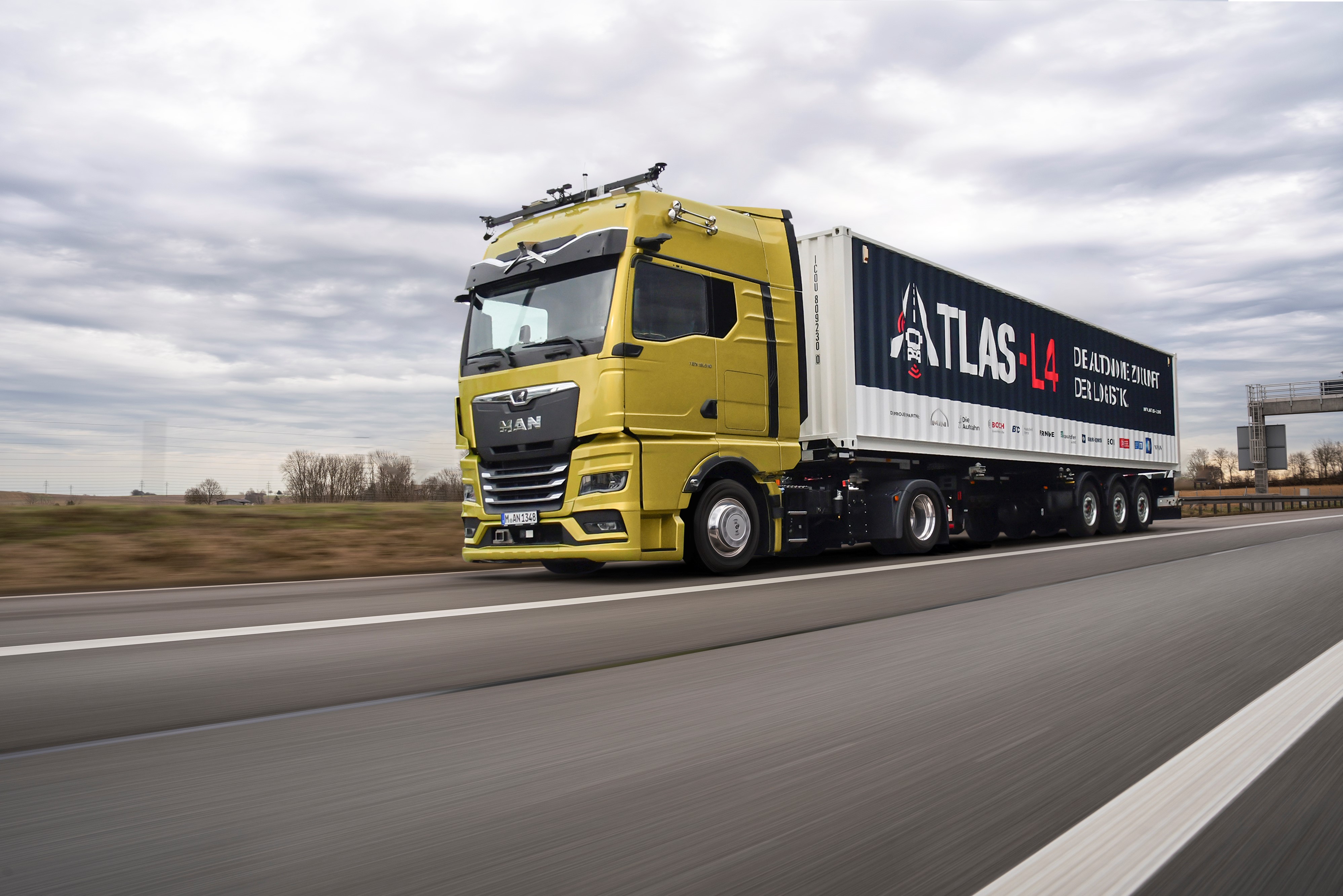ATLAS-L4 funding project records important milestones
Autonomous truck sets course for the motorway

"ATLAS-L4 will soon be the first autonomously driving truck on a highway in Germany," says Dr. Frederik Zohm, Executive Board Member for Research and Development at MAN Truck & Bus, describing the common goal of the twelve ATLAS-L4 project partners. "In this way, we want to contribute to hub-to-hub automation, i.e. driverless commuting between logistics yards, and thus to greater safety, greater efficiency and less congestion on the roads - automation concepts can also be used to counter the shortage of drivers."
What has been achieved since the start of the project?
The partners jointly presented the results of their work to date at a project event in Munich on October 24, 2023.
As part of its project responsibility for overall system development, MAN Truck & Bus has now built a prototype vehicle. It features sensors on the roof, front, and sides of the driver's cab, as well as built-in computers inside. In the first stage, it will be used as a sensor vehicle to collect data before the functional development for autonomous driving begins with it, including initial test drives on the highway with a safety driver. The vehicle has already successfully covered its first kilometers at MAN's Munich test site. Functionalities and interfaces were put to the test: for the first time, the components communicated with each other and, for the first time, the sensors performed a realistic environment detection.
The safety-relevant subsystems for the Level 4 architecture - the vehicle electrical system, steering system and redundant braking system - have also been designed and successfully tested in the first prototypes.
Another milestone to which the project team has already been able to add a tick: The Control Center for technical supervision was successfully commissioned in September 2023 and the connection to the vehicle installed. The web interface now displays the vehicle on a map with all relevant information such as speed and automation status.
Furthermore, MAN and the Fraunhofer Institute for Applied and Integrated Security AISEC successfully conducted the risk analysis for the vehicle that accompanied the project. On this basis, cybersecurity measures such as authentic and encrypted communication as well as functional security measures such as redundancies and degradation concepts were defined for the autonomous driving system. In the process, extensive attack and failure scenarios are run through and corresponding protection concepts are developed.
The next steps
The next major milestone is the premiere on public roads: The test vehicle is expected to take its first trips on the highway before the end of the year - naturally also with a safety driver on board.
All milestones contribute to the long-term goal of ATLAS-L4: proving that the use of Level 4 automated and thus driverless vehicles on the highway is feasible. This is the cornerstone for future series applications for a Logistics 4.0 - made possible by the network provided by the strong consortium of ATLAS-L4. The project will run until December 2024, at the end of which there should be an industry-ready concept for the operation of automated trucks on the highway.
Wide-ranging expertise
In the project, commercial vehicle manufacturer MAN Truck & Bus is responsible for overall system development and the integration of all components into the vehicle. MAN is also responsible for data transmission to the vehicle and commissioning of the Control Center, which will monitor the test drives in line with the technical supervision provided for in the law on autonomous driving.
In this project, the Fraunhofer Institute for Applied and Integrated Security AISEC is extending its methods for security risk analyses to automated trucks for the first time and is researching solutions for holistic security management. On this basis, security risk analyses and protection concepts for the trucks and their ecosystem are being developed.
Knorr-Bremse, world market leader for braking systems, develops the special redundant braking system architecture that enables safe operation of a Level 4 truck in any situation.
The project partner Leoni ensures that the onboard network and the electronic line distribution of the automation system also always function reliably, regardless of any faults that may occur.
Robert Bosch Automotive Steering GmbH is developing a fault-tolerant steering system for ATLAS-L4 that meets all requirements for SAE Level 4 automation.
The Munich-based startup Fernride GmbH is investigating the possibilities of teleoperation in the hub-to-hub scenario addressed by the project. With Fernride's teleoperation platform, autonomous vehicles can be monitored and, if necessary, controlled remotely.
The test tool manufacturer BTC Embedded Systems AG is dedicated to scenario-based and simulative test approaches for complete vehicle verification and safety validation with special consideration of critical driving situations.
The Institute of Control Engineering at TU Braunschweig is developing concepts for the safe operation of Level 4 trucks and for the technical self-awareness of automated vehicles, among other things.
The Chair of Automotive Engineering at the Technical University of Munich contributes its expertise with regard to various aspects of vehicle dynamics and develops interaction concepts for technical supervision.
TÜV SÜD brings its extensive experience with test environments for automated vehicles to the project test drives, testing the capabilities of the vehicles themselves as well as the validity of the simulation, and evaluating the safety of the vehicles as part of the release process.
With the law on autonomous driving, the approval of operating areas on highways falls under the responsibility of Autobahn GmbH. As part of the project, it is developing a digital management system for operating area approval and is contributing its many years of expertise in the field of cooperative and connected driving to the project.
WIVW GmbH is setting up a teleoperator workstation that allows the control of a virtual truck by coupling it with the driving simulation. The requirements developed for a teleoperator workstation can thus be converted into a concrete concept, implemented, visualized and evaluated.
 Fraunhofer Institute for Applied and Integrated Security
Fraunhofer Institute for Applied and Integrated Security